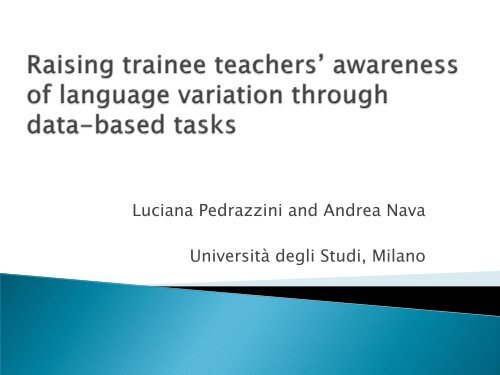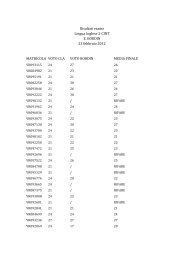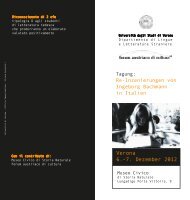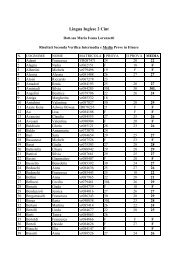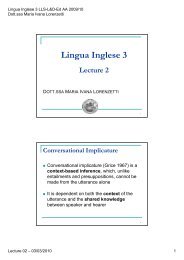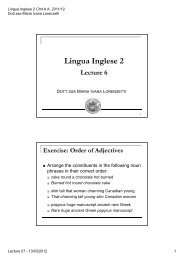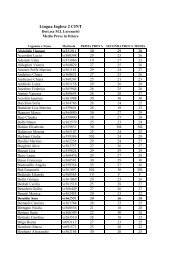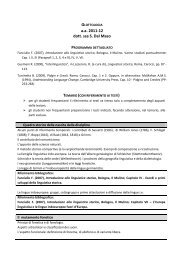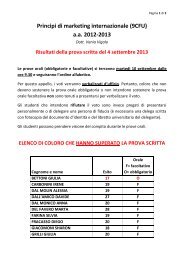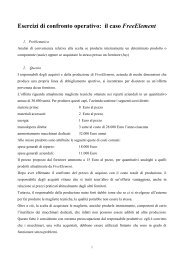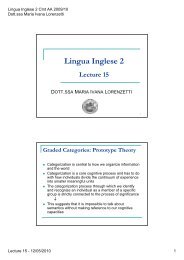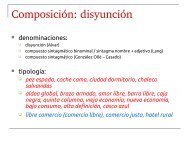Pedrazzini - Nava
Pedrazzini - Nava
Pedrazzini - Nava
You also want an ePaper? Increase the reach of your titles
YUMPU automatically turns print PDFs into web optimized ePapers that Google loves.
Luciana <strong>Pedrazzini</strong> and Andrea <strong>Nava</strong>Università degli Studi, Milano
A study with a group of trainees attending anew ELT teacher education programme run byItalian universities.It follows a previous investigation on the useof English as a lingua franca by a group ofEFL from different L1 backgrounds.<strong>Pedrazzini</strong> & <strong>Nava</strong>- 15.02.20132
• Aimsto investigate how a small group of Englishlanguage teachers working in Italy interact inEnglish in a typical English as a lingua francacontext and view themselves as speakers ofEnglish• ParticipantsFive teachers of English from different firstlanguage backgrounds (Italian, Albanian,Hungarian, Polish and Romanian)• DataTwo focus group interactions (an hour and a half),audio and video recorded and fully transcribed (10,000words)<strong>Pedrazzini</strong> & <strong>Nava</strong>- 15.02.2013
Some lexico-grammatical features incommon with other ELF speakers (e.g.Seidlhofer 2004) Some features can be accounted for by thespeakers’ professional background anddegree of language awareness:- ELF inflectional morphology consistently“repaired” to ENL standard- directness vs. hedging, vagueness andapproximations<strong>Pedrazzini</strong> & <strong>Nava</strong>- 15.02.20134
• The participants seem to express a “staunchbelief” in the primacy of native speakervarieties of English and the need toapproximate standard native English asclosely as possible (Matsuda 2003, Seidlhoferet al. 2006, Jenkins 2007)• They show very mixed feelings aboutexpressing their membership of aninternational (ELF) community or even an L1identity in their L2 English (Jenkins 2007)<strong>Pedrazzini</strong> & <strong>Nava</strong>- 15.02.2013
How can data-based tasks lead EFL teachersto reflect upon:- different varieties of English?- distinctive features of English as a LinguaFranca?- the variety of English they actually use andteach?<strong>Pedrazzini</strong> & <strong>Nava</strong>- 15.02.2013
Data-based tasks:- transcripts of actual teachers’ interactions- corpus-based data (VOICE)‘tangible evidence’ of the use of English indifferent contexts of communication Researcher-led sessions Focus group discussion<strong>Pedrazzini</strong> & <strong>Nava</strong>- 15.02.20137
1. English is spoken as a first or second language inseveral countries, e.g. the United States, the UnitedKingdom, Canada, New Zealand, Australia, India,Nigeria, South Africa, etc. How familiar are youwith the English accents spoken in these countries?What makes a particular accent familiar orunfamiliar to you?2. Is there a particular accent of English you ‘ideally’refer to as a user of English? What is the mainreason for your preference?<strong>Pedrazzini</strong> & <strong>Nava</strong>- 15.02.2013
3. Listen to and identify these accents of English.British English accents:North of England/Wales/ Scottish/Standard English1.2.3.North Americanaccents:Canadian/ GeneralAmerican/USA South1.2.3.Other English accents:Indian/Australian/South Africa1.2.3.4.4. How do you normally find the English used by competentspeakers who do not speak varieties of British, American orAustralian English? For example, varieties of English spokenin India, Africa or Asia, etc. You may use adjectives such ascorrect, incorrect, acceptable, unacceptable, pleasant,unpleasant, familiar, unfamiliar, easy to understand, difficultto understand, etc .<strong>Pedrazzini</strong> & <strong>Nava</strong>- 15.02.20139
1. Have you ever taken part in interactions inwhich English is used as a lingua franca?How do you feel about using English in thiskind of situation (perfectly comfortable/notvery comfortable...)?<strong>Pedrazzini</strong> & <strong>Nava</strong>- 15.02.201310
2. Recent studies have shown that ELF speakers uselexicogrammatical features that depart from the norms ofEnglish as a native language. Analyse these extracts of ELFuse in different contexts of communication and find instancesof lexicogrammatical features that depart from the norms ofEnglish as a native language, for example:use of 3rd person singular zero (so when his or her a: son goback … home and he says)preference for bare/full infinitive over the use of gerunds (inthat case you as a teacher you risk to fail)exploited redundancy (yeah so when you teach youngteenagers obviously you can’t touch the very difficult ordemanding matters)<strong>Pedrazzini</strong> & <strong>Nava</strong>- 15.02.201311
S3: when you teach Maths you don’t payattention the way you talk to your studentswhen you when you teach language. It’s anobject of study but also a medium (.) so boththings and and this make it makesit different I think(English teachers discussing in a small group,from <strong>Pedrazzini</strong> & <strong>Nava</strong> 2010 )<strong>Pedrazzini</strong> & <strong>Nava</strong>- 15.02.201312
S1: {continuous background noise; peoplemurmur and chat (60)} good afternoon ladiesand gentlemen (.) thank you very much forcoming? (.) thank you very much for taking the time (.) right after lunch(.) we always know that that is the mostdifficult time slot (.) but (the) GOOD conferenceorganizers like [org25] (.) put in the mostdifficult time slot always the most interestingtopic (.) where people get a little tired and ithink this is a topic that (could) x wake everybody?(Panel of an international investor conference,from VOICE)<strong>Pedrazzini</strong> & <strong>Nava</strong>- 15.02.201313
1. Read what a teacher of English (S1) says in adiscussion about which English should be adoptedas a teaching model.S1 [...] On what basis do you say ok ok I’m going tofollow the guidelines of American English or BritishEnglish or whatever so: (.) you simply can’t saythat one is superior to the other or you can alsoask yourself a:hm what would all my students needmore? So will they be exposed to a Britishenvironment or often will they be exposed to anAmerican environment etc. etc. [...]How would you answer S1’s question with regardto your students?<strong>Pedrazzini</strong> & <strong>Nava</strong>- 15.02.201314
2. You have an option of using a new coursebook featuring recorded materials withdifferent English accents (British English,American English, Indian English, WestAfrican English, etc.).Would you be happy to use this coursebook in your classrooms?What reactions would you expect from yourstudents?How would you introduce these materials?<strong>Pedrazzini</strong> & <strong>Nava</strong>- 15.02.201315
3. There are materials from ELF corpora whichare freely available for teachers of English, forexample VOICE (2009) www.univie.ac.at/voice,a corpus of spoken ELF.Would you use these or other materials toprepare your students to face communicationin ELF contexts?How would you introduce these materials?What reactions would you expect from yourstudents?<strong>Pedrazzini</strong> & <strong>Nava</strong>- 15.02.201316
How can data-based tasks lead EFL teachersto reflect upon:- different varieties of English?- distinctive features of English as a LinguaFranca?- the variety of English they actually use andteach?<strong>Pedrazzini</strong> & <strong>Nava</strong>- 15.02.201317
S8: er:m as for me I’ve er I studied English at school and:I’ve: I had been u:sed to: learn British English and so (.) Iwasn’t (.) er:m very good at (.) detecting other varietieswhen I: (.) went to university or: (.) the first time I wentto (.) er:: the United Kingdom. and when er: was the firsttime I was in LONDON I: cou:ld (.) er become aware thatthere are different varieties of English. and it was like ashock for me (.) because I: couldn’t understandanything it was like a foreign language er m so (.) whater: THEN I understood that what makes particular andfamiliar to me is (.) the er: the fact that I HEAR it morethan (.) three or four times. er:THEN I become familiarwith the accent […]<strong>Pedrazzini</strong> & <strong>Nava</strong>- 15.02.201318
The first type of tasks was particularlyeffective in involving the participants andleading them to tap their own experiencesand express their beliefs and attitudestowards English varieties. Participants acknowledged the importance ofbeing exposed to and gradually becomingfamiliar with different accents of English asthis will ease comprehension.<strong>Pedrazzini</strong> & <strong>Nava</strong>- 15.02.201319
S1: let’s try not to pay attention to the waythey talk communication is not reallyaffected so this is more I will say accuracyaccuracy is the last aspect which is appliedso we need to take into account also thelevel of the people that are speaking solingua franca there of course it’s alsoaffected these are all aspects that we needto work on so probably the level (..) I wouldsay the last one is I believe the worst<strong>Pedrazzini</strong> & <strong>Nava</strong>- 15.02.201320
S8: I think we should also consider twothings the first one is the level of thespeaker because I think that the first twobecause since they are English teachersmore or less their level should be C2 atleast then about three and fourth text Ithink they are business people we don’tknow where are they from and we don’tknow what their level is because maybebusiness people we cannot say that theirlevel is for sure must be a C1 or could be aB1 or B2<strong>Pedrazzini</strong> & <strong>Nava</strong>- 15.02.201321
The second type of tasks proved to beparticularly challenging as the participantslacked familiarity with transcribed speech. Their analysis did not primarily focus oninstances of typical ELF lexicogrammaticalfeatures but highlighted more the pragmaticeffectiveness of communication.<strong>Pedrazzini</strong> & <strong>Nava</strong>- 15.02.2013 22
S7: it doesn’t matter no matter what the accentis you need to make them aware of thedifferent varieties so I would expose them toseveral accentsS9: my experience is that students are not ableto recognize when they are a different level thedifferent accents they can’t even say if it’s astrong British accent and a strong AmericanEnglish accent they are not able toS2: you mean at an early level?S9: Yeah<strong>Pedrazzini</strong> & <strong>Nava</strong>- 15.02.201323
S5: so to let them know shouldn’t be ashamedof their English so I would make my studentslisten to these texts oral texts to tell them okthis is only a mistake this is not to be donethis is to be avoided BUT the most importantthing is communication<strong>Pedrazzini</strong> & <strong>Nava</strong>- 15.02.201324
S3: communication is the purpose is the aimthat’s for sure but I’m always a little bitworried for my students accuracy because Iknow that they tend to make mistakes theytend to forget about the s I don’t want toexpose them too much to material that isfull of mistakes you see what I mean it’salso I think you should use materials? YESbut in a balance maybe not too much<strong>Pedrazzini</strong> & <strong>Nava</strong>- 15.02.201325
In the third type of tasks- trainees showed their willingness to exposetheir students to a variety of accents althoughnot at an early stage of learning;- they considered the use of data from ELFcorpora an opportunity to make studentsaware that not being 100% accurate in similarcontexts of communication is acceptable BUTthey also seemed to be worried about the factthat students may pick up wrong instances ofthe language if exposed to ELF data.<strong>Pedrazzini</strong> & <strong>Nava</strong>- 15.02.2013 26
Raising trainee teachers’ awareness oflanguage variation: effectiveness of databasedtasks? Task familiarity facilitates tapping beliefs Difficulty in working with data for languageanalysis A focus on language variation within abroader perspective (English varieties, ELF,teacher’s use of English, etc. ) aimed atdeveloping teacher language awareness.<strong>Pedrazzini</strong> & <strong>Nava</strong>- 15.02.2013 27
Jenkins, J. (2007) English as a Lingua Franca: Attitude andIdentity. Oxford: Oxford University Press.<strong>Pedrazzini</strong> L. & A. <strong>Nava</strong> (2010) “The ELF of English languageteachers” in C. Gagliardi & A. Maley (eds.) EIL, ELF, GlobalEnglish: Teaching and Learning Issues, Bern: Peter Lang, pp.283-300.<strong>Pedrazzini</strong>, L. & A. <strong>Nava</strong> (2011) “Researching ELF Identity: AStudy with Non-native English Teachers” in A. Archibald, A.Cogo & J. Jenkins (eds.) Latest Trends in ELF Research,Newcastle: Cambridge Scholars Publishing, pp.269-284.Seidlhofer, B.(2004) “Research perspectives on teachingEnglish as a lingua franca”. Annual Review of AppliedLinguistics. 24, 209-239.Seidlhofer, B. (2011) Understanding English as a linguafranca, Oxford: Oxford University Press.<strong>Pedrazzini</strong> & <strong>Nava</strong>- 15.02.2013 28


